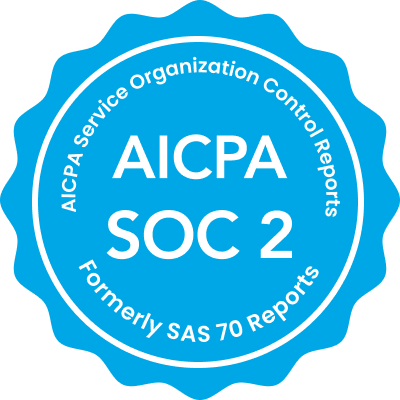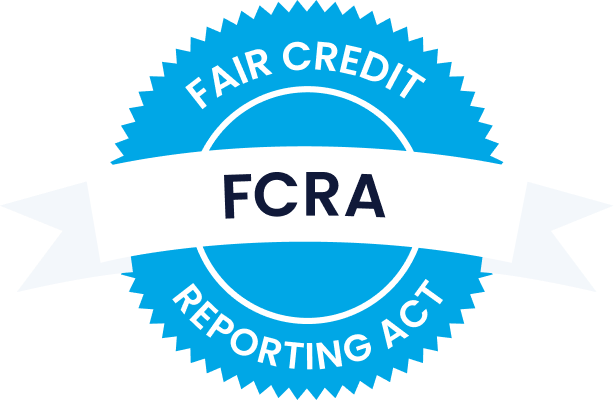Early in August 2022, SingleKey surveyed over 500 Canadian landlords to find out their thoughts about taking on student tenants. With a new school year about to begin, we thought it would be fitting to learn about the ins and outs of the student rental market from the perspective of landlords.
Attitudes about student tenants in the rental business are polarizing. Some landlords regard them as a lucrative demographic, while others prefer to avoid them altogether.
However, according to our survey results, most landlords are enthusiastic about renting their property to students. As long as students meet their requirements, they’re more than willing to offer them tenancy in their rental unit.
In this article, we’ll dig into the survey results to discover why the student rental market appeals to landlords, the most common questions landlords ask students during the screening process, the pitfalls of renting to students, and more.
Let’s begin!
Renting to Students – Good Idea or Bad Idea?
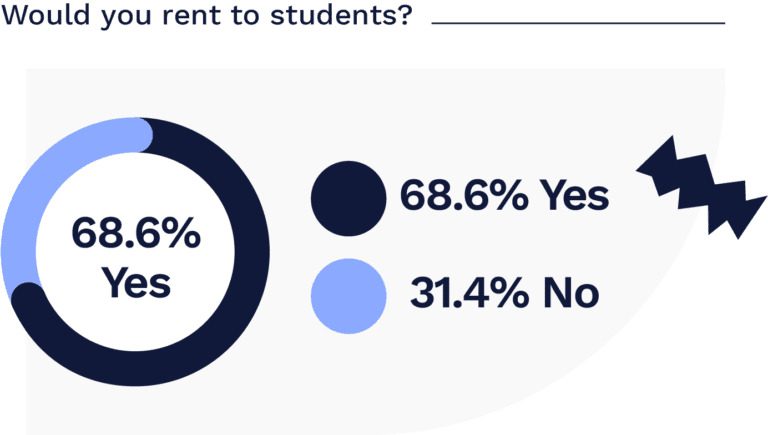
Nearly 69% of landlords said they would rent their property to students. This figure indicates that most landlords aren’t concerned with some of the widely cited drawbacks of young tenants: lack of a stable income, little or no job history, few references, scant credit history, etc.
It’s true that the average student earns little income and has little experience managing money compared to older adults with full-time jobs. But to say they’re strapped for cash would be an exaggeration. In reality, there are plenty of resources students can tap into to finance their living expenses while they pursue their studies.
The Impact of COVID-19 on Student Rental Demand
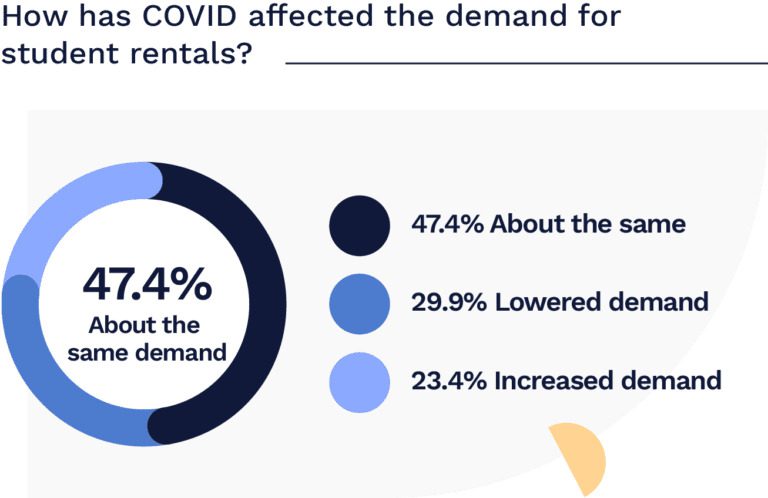
Over 47% of respondents indicated that COVID-19 didn’t affect the demand for student rental properties. About 29% said it lowered demand, and 23% said it increased it.
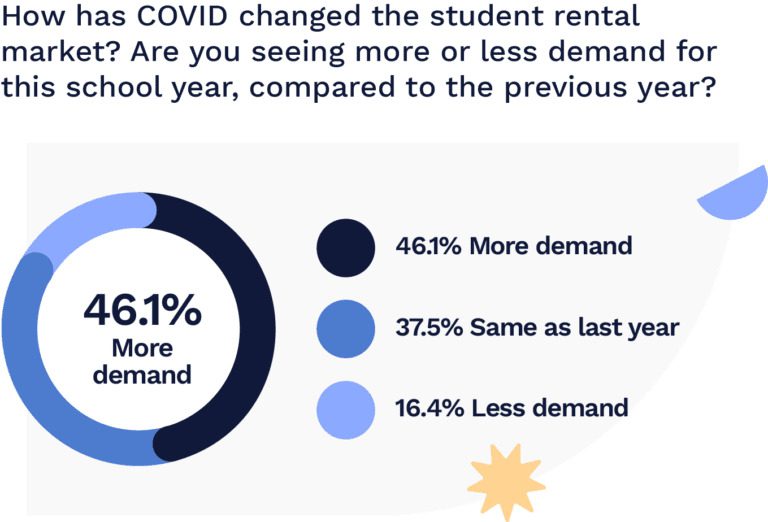
We also asked how COVID-19 has specifically affected the student rental market in 2022 compared to 2021. Thirty-six landlords stated demand remained unchanged, 46% said it was higher, and 16% said it was lower.
Landlords’ answers to these two questions suggest that this year’s demand has grown for student rentals due to COVID-19 or has at least remained stable.
During the height of the pandemic, colleges and universities shuttered their doors, shifting to online learning. While some kept their doors open, others decided to close them to curb the spread of the virus. As a result, many students had no choice but to search for off-campus accommodation. This event may have kickstarted a 2022 trend in students favouring apartments rather than dorms in some regions.
Students’ Attitude Toward Living with Roommates Due to COVID-19
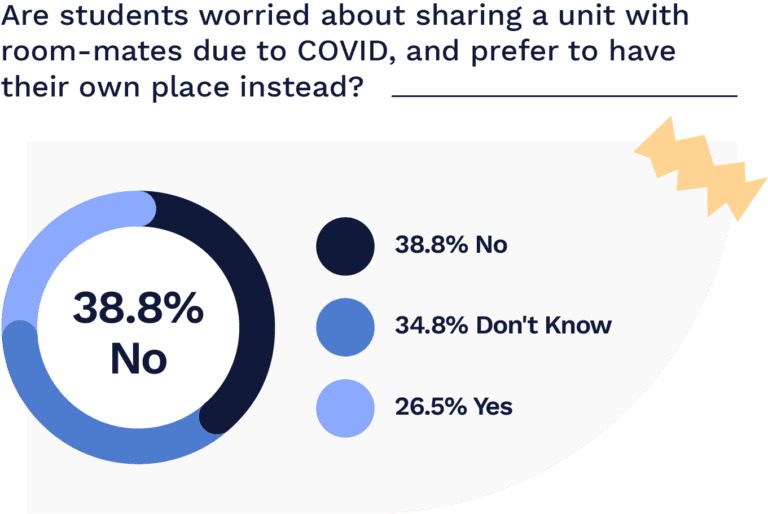
About 27% of landlords reported that students expressed reluctance about living with roommates for fear of contracting the virus; they preferred to live independently. Nearly 39% said that students were not worried about sharing a rental unit with roommates, and about 35% said they didn’t know one way or the other.
These answers suggest that COVID-19 today doesn’t deter most students from sharing a rental with roommates.
How Many Students Should Live in a Single Rental Unit?
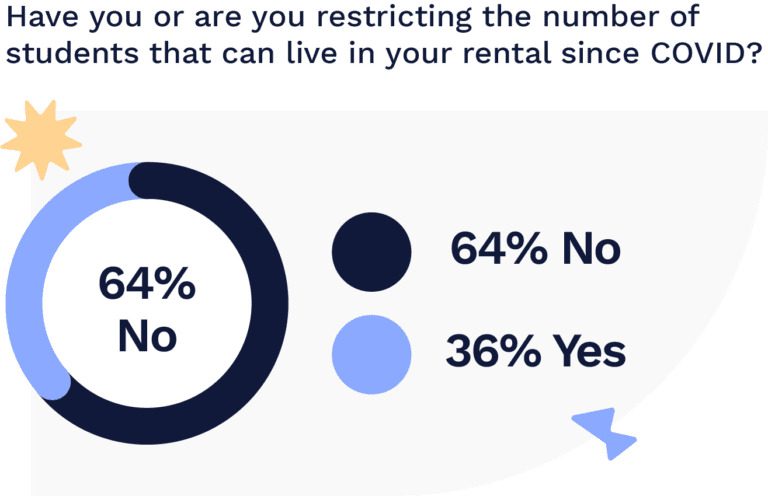
Thirty-six percent of landlords said they’re restricting the number of students that can live in their rental since COVID-19. While not the majority, this figure indicates that many landlords have concerns about too many people living together in their rental unit.
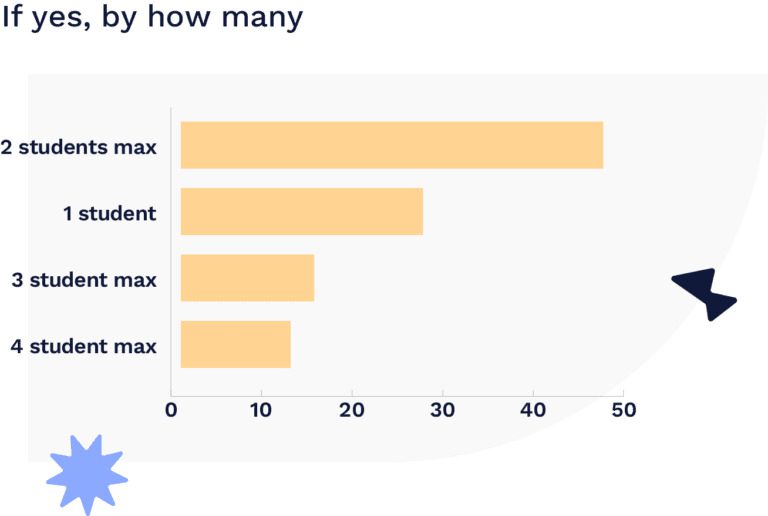
We also asked the landlords who answered “yes” the maximum number of students they would allow to live in their rental. Here’s the breakdown:
Based on the results, most (nearly 75%) landlords would agree to at least two people sharing their rental unit.
Overcrowding is an issue when it comes to limiting the spread of COVID-19. But landlords also impose limits on the number of occupants for other reasons. Primarily, they want to ensure the living space can adequately accommodate each tenant’s needs.
One-year lease or eight-month lease – which do landlords prefer?
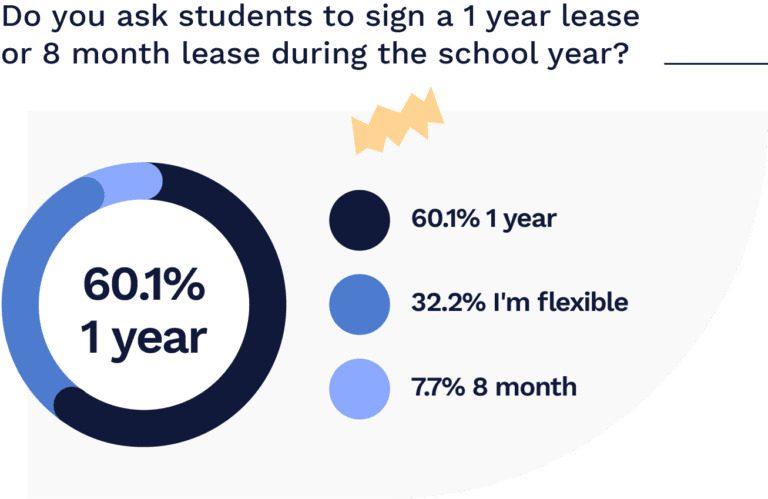
Just over 60% of landlords expressed that they ask student tenants to commit to a one-year lease. Only 8% said they offer an eight-month lease, but 32% were open to the idea if a student requested one.
Since a typical school year spans eight months, many students request a lease agreement that matches this time frame. Naturally, this preference conflicts with landlords, who want stable rent payments for as long as possible. So, it’s no surprise that most ask students to commit to a one-year lease.
Still, about a third of landlords are flexible and willing to accommodate students with shorter leases.
The Importance of a Co-signor or Guarantor
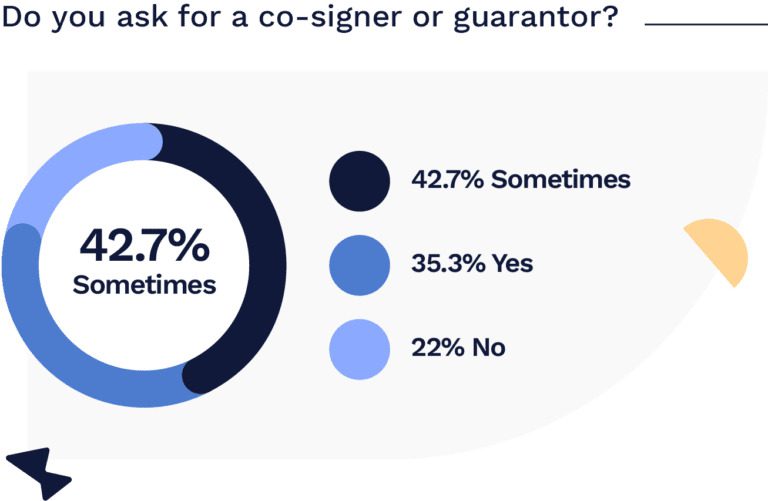
Over 35% of landlords said they ask students to provide a co-signor or guarantor as financial security for rent payments. Those who said they never ask for either were in the minority, at 22%, while those who sometimes require one compromised the largest group, at nearly 43%.
Students are more likely to have poor credit and fail to meet income requirements than other applicants. As a result, most landlords require or consider asking for a co-signor or guarantor to sign the lease agreement alongside the student.
Key Questions Landlords Ask Students
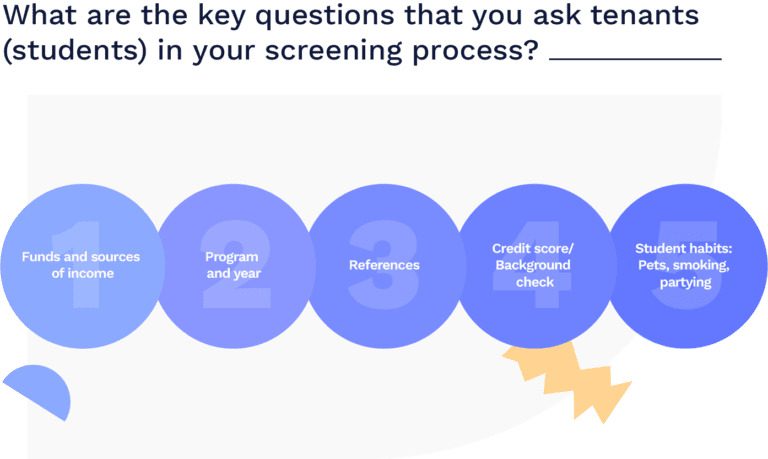
We asked landlords to list the most common questions they ask students during the tenant screening process. Here are the top five:
- What are your income sources and monthly income? It should be no surprise that landlords want confirmation that students have sufficient income to cover their rent payments.
- What program are you enrolled in, and what year? First-year college students are less experienced with finances and living independently than those in their fourth year of studies.
- Can you provide references? Credible references from an employer or past landlord provide valuable insight into a student’s character and personality.
- Do you consent to a credit and background check? A credit score and credit history can help a landlord assess the likelihood of a student defaulting on rent payments. A background check details any past misconduct and other questionable or dangerous behaviour. Both reports can help uncover red flags in tenants.
Do you own a pet, smoke, host parties often, etc.? Most landlords are interested in learning about a student’s lifestyle and habits. They can use the information to determine if they’ll be a good fit for their rental unit and abide by the rules in the lease agreement.
Top Pros and Cons of Renting to Students
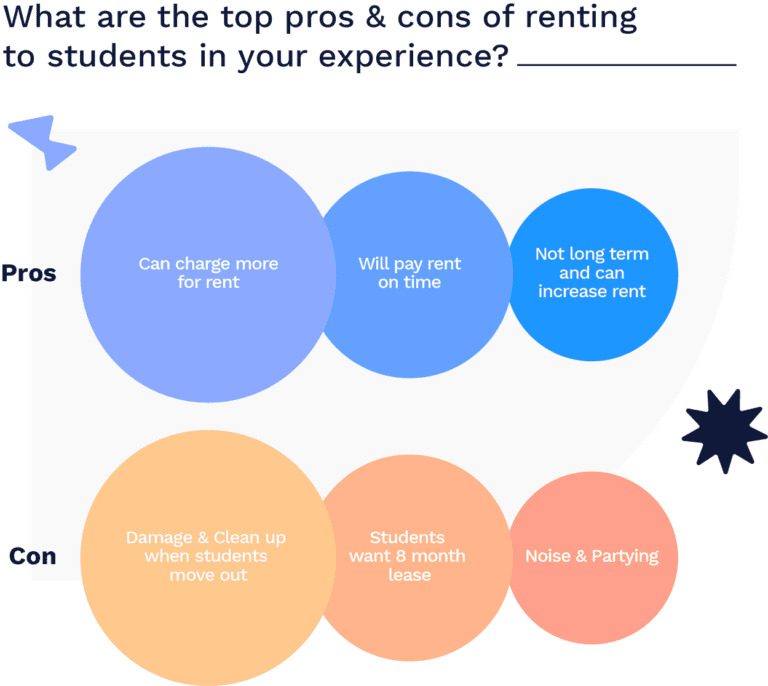
Here are the top three pros and cons of student tenants that landlords mentioned in our survey.
Pros
- Opportunity to charge a higher rent price. Demand for student rental units remains consistent and predictable each year, especially for properties near college campuses. As a result, landlords can justify higher rent prices.
- Timely rent payments. Most students have access to plenty of financial resources. These include student loans, student lines of credit, scholarships, and grants. For this reason, they usually have no issues meeting rent payment deadlines.
- Ability to increase the rent price frequently. By law, landlords cannot raise a sitting tenant’s rent upon lease renewal by more than the maximum amount set by the province where they live. However, once the current tenant vacates the unit, the landlord is free to charge whatever monthly price they wish for the new tenant. Since students typically rent out a property for a brief period, landlords have more opportunities to hike their rent price.
Cons
- Property damage. Landlords often complain about students neglecting their apartment cleaning duties or damaging the property.
- The student may want an eight-month lease. Many students request an eight-month lease to coincide with their school year. Consequently, landlords lose out on four months’ rent payments, given that a standard lease agreement lasts one year.
- Excessive noise and partying. Constant noise and partying, especially during the evening, can disrupt neighbours, leading to arguments and complaints filed with the police.
Final Thoughts
Our survey results indicate that most landlords view student tenants positively. Despite the drawbacks, they perceive this young demographic as a great return on investment for their rental properties.
Some landlords are taking precautions due to COVID-19, such as limiting the number of people living on their property. But overall, the student rental market appears to be robust – demand is either growing or stable.
Another key takeaway from this survey is the importance of vetting applicants. For the most part, landlords pose to students the same questions they would to any other class of tenant. These questions focus primarily on the individual’s finances and background (such as the presence of criminal convictions).
Suppose you’re a landlord open to renting your property to students. In that case, having access to such information is crucial for decision-making. You’ll be better able to differentiate between a quality tenant and one who’ll cause nothing but trouble and endless headaches for you.
Singlekey’s Tenant Report provides all the details you could ever need to screen a candidate. It’s a cinch to read and free of confusing jargon, so you can quickly determine which applicants to consider and which to ignore. Order a report today to begin screening your latest applicant – it’ll be ready for you in as little as five minutes!


